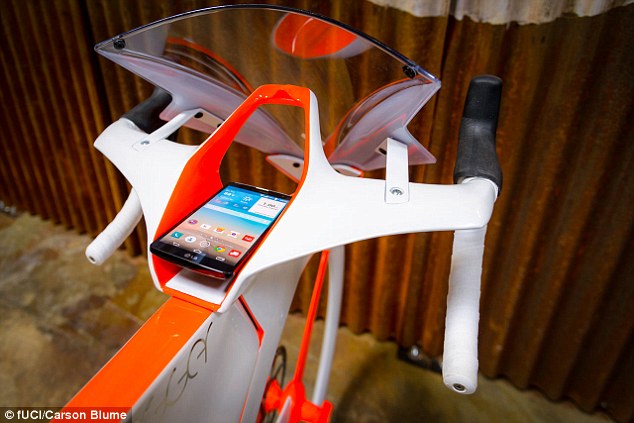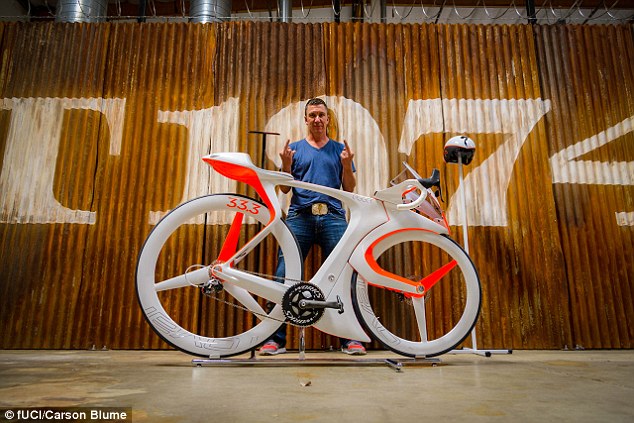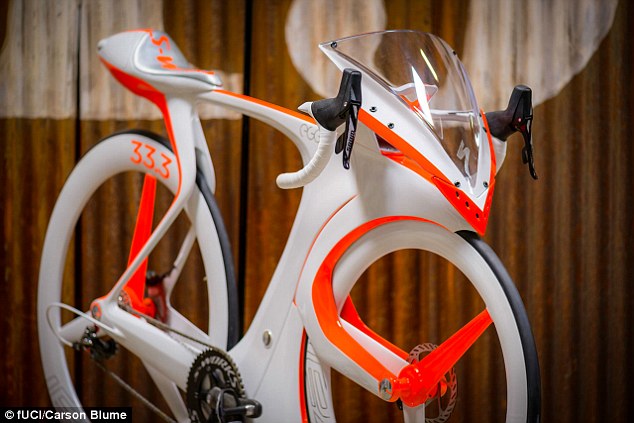CAPSLOCKSTUCK
Spaced Out Lunar Tick
- Joined
- Feb 26, 2013
- Messages
- 8,578 (1.90/day)
- Location
- llaregguB...WALES
| System Name | Party On |
|---|---|
| Processor | Xeon w 3520 |
| Motherboard | DFI Lanparty |
| Cooling | Big tower thing |
| Memory | 6 gb Ballistix Tracer |
| Video Card(s) | HD 7970 |
| Case | a plank of wood |
| Audio Device(s) | seperate amp and 6 big speakers |
| Power Supply | Corsair |
| Mouse | cheap |
| Keyboard | under going restoration |
A bicycle that puts your smartphone at the centre of its design could revolutionise cycling as we know it.
A concept bike that allows you to disable the entire system when locking up as well as generate power and offer routes while you pedal is being developed.
And while the fUCI bike won’t abide by the official rules for racing bikes, it offers a tantalising glimpse into the future of cycling.

The fUCI is an e-bike powered by a lithium battery to enable super-fast acceleration.
It also uses a fly-wheel - a device that can provide energy even when you're not pedalling - to increase efficiency.
Robert Egger, creative director of California-based bike manufacturer Specialized, built the concept bike to revolutionises the design of the bicycle from the ground up, reimagining everything from the aerodynamics to streamlined integration using the latest technology.
The fUCI comes with a smartphone docking station at the front with a built-in solar panel and a futuristic protective visor.
Egger imagines a bicycle with all the smart functionality of modern cars, controlled by a centrally mounted smartphone.
‘This is a bike all about what could be, not what it necessarily is right now, but what bikes could be,’ said Egger on the concept page of the bike.
‘We should embrace cars,’ he said ‘Let’s not hate on cars, let’s embrace the technology they have and where it makes sense, infuse that with bicycles.’
The bike’s name is a playful poke at the competitive cycling regulator Union Cycliste Internationale (UCI) which states that ‘the addition of mechanical or electrical systems that serve to assist the rider is prohibited.’
The fUCI is not on sale but is intended to draw attention to the potential of technology to broaden the horizons of cyclists, and Egger worked on the bike for six months as a side project.
‘The idea would be that your smart phone runs the whole bike,’ said Egger. ‘Everything from disabling it if you want to lock it up, to being able to program in your ride route, or suggest alternative routes if you’re trying to get to a specific place.
‘It knows when it gets dark and turns the lights on, lets you know when tire pressure is low, or senses a car getting too close to you and warns you.
‘It’s infinite how many things digitally and electronically we could do with a bike like this. It’s like, you could program this bike and say, “I wanna burn this many calories” or “I wanna produce this many watts.”
‘Well, that could tell the motor only to work so hard, so that you’re producing on average 200 watts for the whole ride.’
THE FUCI SMARTBIKE
This concept vehicle uses a smartphone as a central hub to coordinate sensors that would bring the functionality of modern cars to the bicycle.
This would include a motor for quick acceleration, GPS route suggestions and proximity sensors.
The bike would know when it is day or night and be able to switch lights on or off accordingly.
The battery would be powered by a solar panel and by its rider pedaling.
The bike would be able to deactivate completely when locking it up using the mounted smartphone as its central control system.
Using the smartphone as its central hub, the bike would know when it is day or night and be able to switch lights on or off accordingly, and use proximity sensors like in modern cars to give cyclists a warning when other vehicles approach.
Egger said the fUCI would utilize GPS and route suggestions to modernise the whole cycling excperience.

Media coverage of the next generation of cars has gone into overdrive, with self driving vehicles and electric models stealing the headlines.
But the basic design of the humble bicycle has remained largely unchanged for decades, and one designer wants to change that.
Robert Egger has ditched official regulations imposed by the competitive cycling regulator UCI to put smart technology at the heart of a new design.

A concept bike that allows you to disable the entire system when locking up as well as generate power and offer routes while you pedal is being developed.
And while the fUCI bike won’t abide by the official rules for racing bikes, it offers a tantalising glimpse into the future of cycling.

The fUCI is an e-bike powered by a lithium battery to enable super-fast acceleration.
It also uses a fly-wheel - a device that can provide energy even when you're not pedalling - to increase efficiency.
Robert Egger, creative director of California-based bike manufacturer Specialized, built the concept bike to revolutionises the design of the bicycle from the ground up, reimagining everything from the aerodynamics to streamlined integration using the latest technology.
The fUCI comes with a smartphone docking station at the front with a built-in solar panel and a futuristic protective visor.
Egger imagines a bicycle with all the smart functionality of modern cars, controlled by a centrally mounted smartphone.
‘This is a bike all about what could be, not what it necessarily is right now, but what bikes could be,’ said Egger on the concept page of the bike.
‘We should embrace cars,’ he said ‘Let’s not hate on cars, let’s embrace the technology they have and where it makes sense, infuse that with bicycles.’
The bike’s name is a playful poke at the competitive cycling regulator Union Cycliste Internationale (UCI) which states that ‘the addition of mechanical or electrical systems that serve to assist the rider is prohibited.’
The fUCI is not on sale but is intended to draw attention to the potential of technology to broaden the horizons of cyclists, and Egger worked on the bike for six months as a side project.
‘The idea would be that your smart phone runs the whole bike,’ said Egger. ‘Everything from disabling it if you want to lock it up, to being able to program in your ride route, or suggest alternative routes if you’re trying to get to a specific place.
‘It knows when it gets dark and turns the lights on, lets you know when tire pressure is low, or senses a car getting too close to you and warns you.
‘It’s infinite how many things digitally and electronically we could do with a bike like this. It’s like, you could program this bike and say, “I wanna burn this many calories” or “I wanna produce this many watts.”
‘Well, that could tell the motor only to work so hard, so that you’re producing on average 200 watts for the whole ride.’
THE FUCI SMARTBIKE
This concept vehicle uses a smartphone as a central hub to coordinate sensors that would bring the functionality of modern cars to the bicycle.
This would include a motor for quick acceleration, GPS route suggestions and proximity sensors.
The bike would know when it is day or night and be able to switch lights on or off accordingly.
The battery would be powered by a solar panel and by its rider pedaling.
The bike would be able to deactivate completely when locking it up using the mounted smartphone as its central control system.
Using the smartphone as its central hub, the bike would know when it is day or night and be able to switch lights on or off accordingly, and use proximity sensors like in modern cars to give cyclists a warning when other vehicles approach.
Egger said the fUCI would utilize GPS and route suggestions to modernise the whole cycling excperience.

Media coverage of the next generation of cars has gone into overdrive, with self driving vehicles and electric models stealing the headlines.
But the basic design of the humble bicycle has remained largely unchanged for decades, and one designer wants to change that.
Robert Egger has ditched official regulations imposed by the competitive cycling regulator UCI to put smart technology at the heart of a new design.










